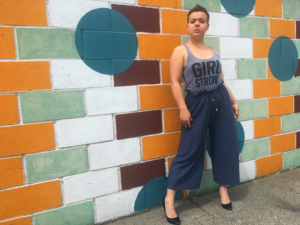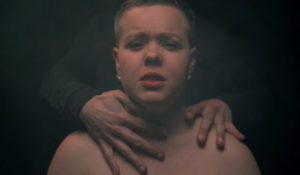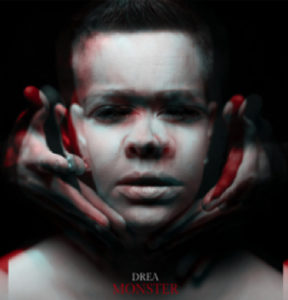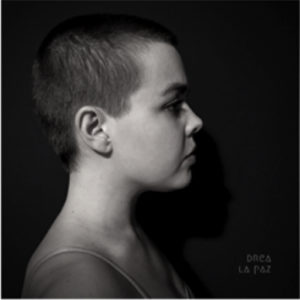
LA artist/songwriter Drea wrote the most important and powerful song of her music career for a friend’s project. But realizing it held a personal significance for her, she held on to it for years waiting for the right time to release it. That time came on April 12 when she simultaneously released her powerful single “Monster” and its music video for Sexual Assault Awareness Month.
“Monster” is both a deeply personal song and video that focuses on the emotions and moments the night Drea was raped. The song is her most powerful message and with its completion, Drea cites that completion of the project has closed a painful chapter in her life. But she’s glad she was willing to go to this dark place to tell her story because she wants people to talk about consent, to understand the power of coercion, and that rape is rarely the stranger scenario.
This release will be Drea’s last for a while. After she became more active in women’s advocacy through her own projects and local non-profits, she decided to pursue what rings truer with her life’s purpose. Drea will leave behind her music career to begin graduate school this summer with the goal of receiving her Ph.D. with a specific focus on gender in policy. Music, she says, will always be part of her and she plans to continue to make it, but not as a career goal.
A sexual assault survivor and lifelong dancer, Drea launched Reclaim Movement on January 31, 2018, an open level dance class working to empower women who are survivors of sexual assault. In May 2018, Drea launched her first event as the founder of the For Her Concert Series, a live music event organized, staffed, and performed by women that benefits women in need.
Drea serves on the board of directors for The Ladybugs Movement, a non-profit campaign which works to bring feminine hygiene products to homeless women in Los Angeles. In October 2018, Drea was elected as the youngest board member for LA-based non-profit Project MuszEd which works to provide opportunities and resources in music education for underprivileged youth.
Learn more about Drea’s musical journey through our first interview and subsequent behind the scenes interviews for her singles La Paz, and Parachute.
I recently interviewed Drea via email about behind-the-scenes work on both the video and single for “Monster”. Drea takes us through the concept, production, choreography, special effects, and shooting of the video. In addition, Drea discusses her music career, imparts powerful advice for women artists, and much more.
Congratulations on the release of your most powerful single, “Monster”, and the coinciding music video for it. This incredibly impactful song is deeply personal as it deals with your emotions and moments the night you were raped. What motivated you to write it?
Thank you! This song is about my experience with rape, and I actually didn’t sit down with an intention to write a song about my situation. I was working on a project for a friend, and “Monster” is the song that came out. The song was actually supposed to go to another artist, but as I sat with the song, I realized the personal significance the song had for me, and I ended up holding onto it for years. It finally felt like the right time to complete the project, and thus close this painful chapter of my life.
Explain the music video’s concept/focus.
I’ve had the main concept for this music video in my head for several years now. I knew I wanted the video to be fairly simple, to focus on my emotions instead of depicting a specific storyline. I wanted the video to be uncomfortable for people to watch, and to be shocking and powerful.
Originally, I wanted to film the video in black and white and in the last few moments fade into color to reveal that what is on my face is blood, but once I decided to add a dance element, I opted to film the whole video in color.
What do you want people to take away from “Monster”, both the song and the music video?
I want people to talk about consent. I want people to understand the power of coercion, that rape is so rarely the stranger in an alley scenario people have been taught to associate with the word. Unlike with other crimes, survivors are often the ones who end up being on trial. Women especially have to fight several times as hard to have their voices heard, let alone their stories believed.
Rape is still far too common in our culture, and the lack of justice for survivors is simply unacceptable, and we need to be talking about it until this changes.
Why have you said that “Monster” is the most important release of your career?
I’ve been waiting a long time for this one. The situation that sparked this song changed my life. It changed who I am, how I view the world, and how I operate within it. “Monster” is not only my best work from a writing and visual standpoint, but it is also my most powerful message. I didn’t cut any corners on this one.
Explain the production process for the single.
“Monster” went through several phases and producers over the years before I settled on the current production. I knew it had to be right, and I wasn’t going to release it unless I felt it was exactly the way I wanted it to be. Kayja was the perfect partner for this release because he has always been able to take my ideas and implement them into a track. On top of that, we are good friends who have a long working history together, so I knew I could trust him with a project of this caliber.
By the time I brought “Monster” to Kayja, I knew that I wanted the song to be raw, so the production had to be subtle, but powerful.
We finally hit gold when I came up with the idea of the hums that run throughout the song. I used my body to create the underlying percussion, and then I decided to use an accidental breath as part of the beat as well, and “Monster” started to take form.
You produced and co-directed the ‘Monster’ music video. Take us through the process of making it from the idea, creating the dance choreography, the set, using special effects, costume design, and the production.
As I mentioned before, the initial idea of using hands to put blood on my face has been with me for years. As I continued to have discussions with Chris Koehl of Koehl Visuals, we decided it would be best to have a similar performance shot without the blood, using the blood as a common thread throughout the video. I also realized that I wanted a male lead to put the blood on my face, instead of me doing it myself, to really convey the message of the video. Kayja, without knowing what I was planning, asked if he could have a cameo in the video, and then the job of “the hands” was his! I don’t think he knew what he was getting into, but he did a great job handling his role on an incredibly heavy shoot day.
I knew that the performance and blood shots would be shot from the shoulders up, and I wanted to be naked for those shots in order to portray the vulnerability and hints of an unwanted sexual act throughout those moments. I decided to wear fancy earrings to symbolize the idea that this was unexpected, I was caught off guard in what should have been a composed moment, and was unwillingly stripped bare. As I began to unpack the idea of having a dance element, I remembered I had a blood-colored garment that would allow me to move but also go nicely with the theme. Unlike “La Paz,” there was actually no choreography in this video. However, I did want there to be a dance element, so we did several shots of my freestyling in the fog.
The fog was Chris’s idea, and I am so happy we decided to use this special effect. It really worked with me on the set, through the dancing and the performance, and made all the difference to create the creepy, threatening ambiance we needed for this video.
I originally wanted a white background, but then I realized that it would look too much like a psychiatric ward, and that was not at all what I was going for from a message standpoint. I opted for a black background instead, and Chris had worked in the Oh My Ribs! Theater before, and it looked perfect.
Tell us more about the Oh My Ribs! Theater in the theatre district of Hollywood where the video was filmed. How did you find it? Why did you choose it?
Chris had shot a dance video at the theater before, it was within my budget, and was the right size for what we wanted to do. We liked the idea of having the whole place to ourselves, as this was an incredibly delicate and trying shoot, so it was wonderful to know we wouldn’t be disturbed by other studios next door, which can happen in larger studio complexes.
There are very intense scenes involving the hands of a male figure, your bare neck and shoulders, and the blood. What do they symbolize? How did the track’s producer DJ Kayja feel about playing that part in the video?
The nakedness of those shots is reflective of the vulnerability and helplessness I felt during my experience with rape. Sitting with my back to the man, I am powerless to avoid his touch. The blood symbolizes the death of my younger self. The younger, more free-wheeling and naive version of me died that night. I had to become a new person in order to survive.
The blood is also there to make it very clear that these touches are unwanted and violent in nature.
Kayja certainly didn’t know what he was getting into, and although I can’t speak for him, I can only imagine it was incredibly uncomfortable for him to play this role. As someone who cares for my well-being, it was hard to play the role of someone who wanted to hurt me and take advantage of me. As Chris and I cut through the footage, we actually could see this in many of the shots; Kayja’s hands were trembling at some points, that’s how powerful this shoot was. In the end, those moments made the video that much more powerful, and I’m thankful Kayja was willing to go there with me on shoot day so we could tell this story in the most impactful way possible.
What does your solo dancing in the video symbolize?
This is actually the question most people have about the video. For me, the dancing shots of me are symbolic of my future self, watching everything unfold, but staying strong through the entire act and in the years of recovery afterward. She is strong, she is powerful, she is frightening and commanding in who she has transformed to be. One of the very last dance shots is of me holding my hand up as if to say “enough,” as the act comes to a close. She is there, not to threaten me or the viewer, but to stand in a contest against the perpetrator; she is the witness holding him accountable. Quite simply put, without this character, without this future self looking out for me, I don’t think I would have survived.
Describe how you felt making such a deeply personal video.
Honestly, there was so much of me that didn’t want to make this video as the film date drew near. I had gone to an incredibly dark place when recording “Monster,” and I knew I would have to return to that place in order to film the most powerful video representation of my experience possible. Many people thought it would be cathartic for me, but honestly, it was terrible having to go back to that place when I feel like I have healed from it. My nightmares and anxiety came back as I prepared for the video, and the mood on set was incredibly heavy. I cried in almost every shot, and it was exhausting. That being said, it feels amazing to have this out in the world, and I’m so glad that I was willing to go to that dark place in order to tell my story.
As a rape survivor and lifelong dancer, you launched in January 2018 your powerful Reclaim Movement, “an open level dance class working to empower women who are survivors of sexual assault and abuse to reclaim ownership of their bodies through music and movement.” When you leave Los Angeles to start graduate school in August, are you still going to teach Reclaim Movement? What future plans do you have for it beyond 2019?
I would love to continue Reclaim Movement in Minneapolis while I am in grad school, and I hope to be able to do so. I have taught a few classes there on trips home, and there certainly is a need for a class like this in any city. It will take me a while to adjust to the rigors of graduate study, but I’m hoping that once I get into the swing of things, I will be able to teach these classes again.
You created For Her Concert Series “a live music event organized, staffed, and performed by women that benefits women in need” and held your first and successful event in 2018. What are your future plans for it?
I would love to hold one more For Her Concert event before I leave for Minneapolis, but we will see if I have the time to put that together on top of planning such a big move. It is possible that I could host events in Minneapolis, as there is certainly a vibrant music scene, but I don’t have any plans to do so at this time.
You recently announced on your Instagram that this track was your swan song from the music business after being in Los Angeles for 5 years. What made you come to this decision?
As I began to take a more active role in women’s advocacy through my own projects and local non-profits in Los Angeles, it became clear that the main goal of my life was to be as useful as possible. Playing the games in the LA music industry was not ringing true to my purpose. Music has given me a beautiful platform to speak out against the social injustices that still disproportionately affect women, but pursuing a career in pop music was also beginning to hinder me from contributing to my community in the ways I wanted to. In addition, I too rarely have felt respected in the music industry by my male colleagues, and I got to a point where enough was enough.

Do you see yourself coming back to a career in music in the future? Why or why not?
To a career, no. I don’t think I will ever hustle this hard for music again. The benefits have in no way outweighed the immense sacrifices and terrible experiences I have had to endure. I have grown, and I’m grateful for that, but I’m not interested in suffering for my art anymore, especially with so little return. Music will always be a part of me, and I plan to continue making music throughout my life, but not with the goal of making a career out of it. I can make high-quality music from anywhere and can continue to collaborate with my music friends around the world, so I guess we’ll wait and see where this next chapter takes me. I would love to make a jazz album, actually. So, that’s on my radar.
As you look back on your music career, what successes have you had? How do you define success for yourself?
Looking back, I think I’m just so proud of the last four singles I’ve put out in the last 14 months. I really cranked out a lot of music and visuals in a short amount of time and had complete creative and administrative control over all of it. I’ve been so blessed that people from around the world have appreciated and shared my music and, more importantly, my message. I feel like I have been honest, and like I can truly say I have done my best to put my best effort into my work. I’m proud of who I have become, and what I have been able to do as an independent musician with no manager, assistant, or PR firm helping me along the way. I hope other independent artists will be encouraged in knowing that your music can be heard if you work hard and create a solid product.
Perhaps counterintuitively, I am also proud of myself for recognizing that this dream had a shelf life for me. We grow, and we go through seasons, and sometimes we grow out of the dreams we had when we were in our 20s. I’m excited by the prospects of this new phase of my life and know I will be able to utilize so many of the skills I have learned in this industry to improve my community and continue to bring positive messages and important conversations to the table. Leaving the music industry was not about giving up or denying a part of myself, it has been about honoring myself as a whole, multi-faceted person, not just as an artist.
What advice do you think every woman starting out in a music career should have?
If something doesn’t feel right, it isn’t. I wish I had listened to my gut in several situations. I think that many young women, my younger self included, feel invincible in this age of Third Wave Feminism. I didn’t realize how dangerous some of the situations I found myself in were. I hope that women will be confident, but not naïve. This is still a male-dominated industry, and we do have to work twice, three times as hard to be heard and taken seriously. Know your stuff. Understand the business, work on music production, do as much as you can on your own so you don’t need to depend on anyone else to create and market your art. Fight for the recognition you deserve.
If you helped produce it, fight for that credit. If you directed it, say so. Men do this so naturally, but women are still taught to be more humble and not to put up a fuss. Be fair to your team, but not at the expense of being fair to yourself. Demand the credit you deserve. Then keep rising.
Thank you, Drea, for the opportunity to interview you.
Watch the official “Monster” video:
Buy/Download “Monster” on all major platforms: https://song.link/monster
Stream “Monster” here: https://open.spotify.com/album/3zoFxoQxVrNizmnhnlq1if
Follow Drea:
Instagram: @dreaxmusic
Facebook: dreaxmusic
YouTube: Drea
Drea’s website: www.dreaxmusic.com
For more information on Reclaim Movement:
Instagram @reclaimmvmt
Facebook: reclaimmvmt
For more information on the For Her Concert Series:
Instagram: @forherconcertseries
Facebook: forherconcertseries


